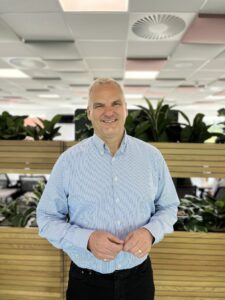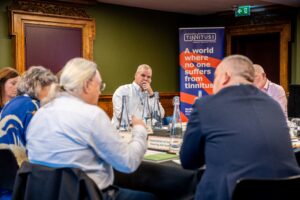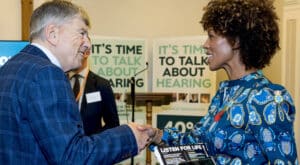While strong challenges disrupt the audiology profession, what does it take to keep HARRISON FORWARD?
Though by no means the only profession convoluted by the UK’s knotty healthcare topography, audiology is frequently delineated in the binary inks of private or public. This bilaterality has been increasingly expressed of late as NHS vs Specsavers.
That such a dichotomy is way too reductive to describe the reality of the domestic hearing healthcare panorama is well underlined by an hour chatting to Gordon Harrison, who is Director of Audiology Professional Advancement at that above-mentioned healthcare and retail group.
His understanding of all things great and small in both profession and market is forged by being, in his own admission, “lucky in my career”, a phrase that soft-pedals the many blocks this Glaswegian has been round as he appreciatively gathered a full idea of how many different ways the same aspects of audiology can be commissioned and delivered, working as an NHS audiologist, in private services, with independents and nationals, and looking after 28 different markets.

Gordon Harrison, Director of Audiology Professional Advancement, Specsavers.
Courtesy of Specsavers
If he is a company man, Harrison does a good job of disguising it in conversation, because on just about every issue his prescriptions for a better future in his chosen sphere do seem to cover the concerns of professionals (of whatever lineage), young candidates for an audiology career, those who do business with hearing instruments or services and, most importantly, the patients who have to pick their worried way across the rubble of policy failures and the unfamiliar shapes of replacement systematisations, whether it is help with hearing loss, tinnitus, or just basic earwax removal that is needed.
From 2024, representing his group while it launched It’s Time to Talk About Hearing, a flurrying Parliament-targeted campaign to push for primary-care NHS adult audiology services to be delivered throughout the UK by the likes of Specsavers, Harrison has played on the front foot in all-party debates at conferences, seeking – and, he says, finding – a collaborative energy across a fragmented profession.
“I’ve not come across many clinicians who really don’t care about the patients; I think everybody does care!” he asserts with a self-assuring nod. Yes, audiology is evidently about good people. But, as it faces a spreading range of major challenges, among which its dwindling workforce perhaps eclipses the precipitous concerns brought by the shock of the new (AI, OTC,…) and the sulphur of the long unsolved (unmet need, continuing stigma, crumbling NHS,…), merely acting in good faith cannot be considered a guarantee of best practice.
The specialty must have a “good robust structure”, says Harrison, and underpin its future through the sharpest focus on regulating, training, and, where heels seem not so much to drag as to dig in to a thick internecine clay, on uniting professionally.
This is crucial across the board, and no less in areas that many would not regard as central enough to justify the intense bickering and often bitchy social network squabbling that it has recently provoked: earwax.
Earwax removal – a service impacted by the step change of Covid
In March 2025, the Royal National Institute for Deaf People (RNID) released a new report showing that, as a feature of an ongoing crisis, more than eight million people in England have zero support from the NHS for earwax removal. The RNID calculates that only 45% of Integrated Care Boards (ICBs) are now actually providing support. The charity has launched a Stop the Block campaign, calling on the Government to step in to ensure everyone who needs wax removal can access it on the NHS, warning of the dangers of undertaking self-management of wax at home.
“I think the lack of regulation around earwax removal is probably the key point: regulation and what constitutes training…and how do you do that?” points out Harrison who, as the RNID has also done, emphasises how self-management of earwax difficulties frequently leads to unintentional self-damagement, surely episodes that Specsavers must deal with frequently?
“We do. Everything that you would imagine, from damage to the ear structure itself, infections within the ear, or the wax being being pushed way further down in the ear, and even to people having burned the ear using candles. I think the most common one you’ll see will be infections and potential damage to the ear drum. Some of the time that may come to us, but it may just go straight to the GP and to ENT.”

Back in 2023, Gordon Harrison selfie salutes a Specsavers Professional Advancement Conference crowd.
Tabatha Fireman
Harrison habitually hears about the problems, “but what I don’t hear are solutions,” he affirms. How does he think the situation became so bad?
“Prior to Covid, we were getting wax removal coming into audiology. We currently have a significant wax business in both NHS and private. So we are providing procured services through the NHS in some contracts across the country, and we have a significant private service as well, to the point we’re doing seven or eight thousand a week,” he explains.
“But I think we’ve seen a step change in Covid, and I think that step change was the fact that GPs were becoming harder to access, and the pressure on GPs at this point and GP services to be able to do that saw them back away a little bit from from providing that service for one reason or another, and that effectively forced people out into the community to seek other services,” Harrison continued.
Good training must support the delivery of audiology services
While growth in earwax services occurred in independent centres and private retail audiology chains, it was the arrival of outsider professions, facilitated by a lack of clear regulation, that brought the issue to crisis point. “From there, we believed it would be under CQC (Care Quality Commission), but that only governs so much, and it only governs people who are named within that. So it probably just needs a little bit of a look-up on that regulation about what and how you do that, because it is probably the most intrusive procedure we do,” stressed Harrison, for whom variations in standards of care is a must to sort out.
“If you can pay for it, you can go get it, but paying for it doesn’t mean that you’re getting the same standard of care that is government-regulated, and that you would be getting if you weren’t potentially paying for it but actually going to a localised service or a primary care service.”

At a round table discussion hosted by Tinnitus UK during Tinnitus Week in February, 2025, Gordon Harrison talks with other stakeholders about unity on approaches to tinnitus.
©Tinnitus UK
Hoping it would iron out the regulation problem, Specsavers – which currently charges £60 for its earwax removal service – proposed an earwax solution as part of its recent campaign and Hearing Health Report.
“We launched a manifesto last year, and within that what we were looking for in wax removal was for it to be a commissioned service by primary care audiology services, so in the way that you have AQP (Any Qualified Provider), or in the way that you have wax removal that is being procured by commissioned services, what they can do is actually set a level of specification within that document, within that tender, within that commissioned service, and that level of specification can dictate training and competence, allowing the individual to be more protected,” outlines Harrison.
Guidance is not enough, he stresses. “I’ve seen suggestions of registers and guidelines; registers and guidelines will be great for the people who are actually trying to do things in the right way with the right level of training and competence, but it’s probably just going to be ignored by those that it doesn’t fit. It’s not going to improve the situation; it will improve the delivery of service for those who are within profession and governed by HCPC (Hearing and Care Professions Council) codes of conduct.”
The double-edged sword of a broadening profession
In other areas, for instance amplification levels for hearing devices, the need for rigorous regulation is again paramount for Harrison, especially with access to self-fitting over-the-counter products. For people with mild to moderate hearing loss, administering self-care in hearing is being encouraged, notably by the UK Government’s recent guidance stressing that new OTC hearing aid devices, or Apple’s Hearing Aid feature, have the potential to help tens of thousands of people with hearing loss. Is this really OK, or should more share Harrison’s concern that the question of whether everyone really does have the ability to administer self-care might be being overlooked?
“Will they understand what they’re doing, understand the implications?” he asks. “If somebody is providing either too much or not enough level of amplification, then they are not going to get the best outcomes. Where is the regulation to protect the consumer at that point, the person who is going to buy something, and understand what they’re buying and understand limitations and the next steps where they can potentially get the right outcomes from it?”
He draws a comparison with recent market offers of tinnitus services, “in a similar sort of way, where you can call yourself a tinnitus specialist and say you do CBT, and again there is no massive regulation around what you can do and how you say that”.
Not that this expert sees over-the-counter (OTC) as either a bad thing for audiology, or as a disrupter that is going to have a particularly fast impact.
“I don’t think we’ll see the impact of OTC for the next five or six years. The average age hasn’t really gone much younger. The average age of a new user is in their late 60s. What you’re seeing from the early data in the States is that the average age for a new OTC wearer is in their late 50s. So they’re accessing things ten years earlier. That can only be good,” he argues.
“Disruptive services is not in itself a bad thing for us. However, disruptive services, with technology and other things coming in, mean that we as audiologists may find our profession broadening and linking into other areas,” says Harrison, pointing as well to hearing aid features that take professional scope into translation services and fall sensors.
“The challenge with broadening our services is that we only have so many audiologists and we know already from the rising population that we’re actually going to have a real workforce challenge, and we know we’ve got a workforce challenge on our hands right now,” he warns.
“The trick is you need to do this and widen services but at the same time you have to be able to make sure that you’re delivering things in the right way. My profession has been good to me and I want the profession not just to survive, but thrive in the future and take opportunities,” Harrison urges, stressing the need for professionals to work together “to make sure that you are delivering services to a standard, that you are held to that standard, and that it’s free at the point of contact. So not just Specsavers, but I think having those NHS commission services available will allow that to to be done across a wider range.”
One voice for the profession
The least optimistic voices in audiology still tend to see the long-craved College, a unified body, as a distant object in the haze, but recent forum debates featuring faces from a range of professional associations – and a number of behind-the-scenes gatherings – are interpreted by some as evidence that certain watchers have their binoculars the wrong way round. Referring to such gatherings as the recent British Society of Hearing Aid Audiologists (BSHAA) Roadshows, the 2024 British Academy of Audiology (BAA) Conference debate moderated by Specsavers, and a recent round-table hosted by Tinnitus UK, Gordon Harrison affirms: “I think we’re way better than we’ve been.” Though his is a reserved optimism, he justifies it at some length.
“As we start to see, not just wax, but tinnitus care and OTC products coming in and challenging the profession, I think people are starting to actually understand that while we squabble about things among ourselves, then other people are coming in and putting pressure on this profession and they can be very, very clear in what they’re doing and how they’re able to do that. If you’re inside the jar, you can’t read the label, and we’re inside the jar not really understanding what’s happening round about this, and I think that is a part of the challenge that we have,” he insists.
“There will be differences of opinion, there will be differences in service, but what shouldn’t really come into it is when patient care or patient outcomes are brought into question because that’s where we can be very clear and say ‘actually there’s some unsafe, potentially unsafe practice; there’s potential requirement for better regulation; there’s maybe other ways that we can do this that has good patient outcomes, good levels of training and good service’.”

© BAA
A beacon is now in view, coincidentally for Harrison in the auld country, when the BAA and the International Society of Audiology, organise – in Edinburgh – the World Congress of Audiology in 2028, “potentially a big opportunity for us to come together”.
“For a number of years, audiology never changed in the UK. It was you come in, you had a hearing test, you got maybe fitted with a hearing aid...and then different things have happened over the period of time, being that digitisation, technology, assisted devices,…but the more things that come in, and more challenges, the more it is going to force us together to actually see what is the goal here,” Harrison predicts.
Specsavers – a big voice

Specsavers Chairman Doug Perkins with TV GP Zoe Williams at a launch for the Hearing Health Report compiled by the retail group.
Through its campaigning mien in 2024, blasting the message out in all four UK parliament buildings, enlisting figures from within and outside audiology, reaching MPs and peers, and even getting the then future Health Minister Wes Streeting along to a Parliamentary session, Specsavers has certainly become a voice that aims to speak for audiology in Britain. And all the intelligence points to this being a long-term drive.
“We don’t think it’s for Specavers to be saying this is a good or a bad thing; we think this is how can we help, through the resources and the size of the organisation, to bring the professional bodies together to have more of a consensus opinion,” Harrison underlines.
“So that’s the work that we’re doing in the backroom with the BSHAA, BAA, the Hearing Loss and Deafness Alliance, and NCHA (Association for Primary Care Audiology Providers) to look at how and where we can maybe get some agreement.”
Meanwhile, however, the ground is shifting. In order to streamline the National Health Service by removing a perceived layer of bureaucracy and returning management to the government, the Government recently announced the scrapping – as “flab” – of NHS England, the body that some voices in audiology were looking to for direction on pathway changes.
There is no knee-jerk reaction to that from Harrison. “I’m a little bit more pragmatic. Let’s just calm down and just see where that goes and engage in discussion and try and get that clarity so that we’re able to say does this make a difference to us?”
As Specsavers puts together another big report for the UK audiology sphere in 2025, its Professional Advancement wheelman is for keeping things steady and balanced: “We’re committed to driving the profession. As I said at the BAA meeting, we’re part of the establishment, and delivering services here. So, we’re investing as much as anybody else has; come and join us and help us as we develop this next report.”
From Audiology News UK issue 14, May-June 2025